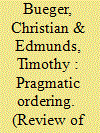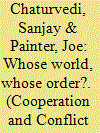| Srl | Item |
| 1 |
ID:
178873


|
|
|
|
|
| Summary/Abstract |
The question of when and how international orders change remains a pertinent issue of International Relations theory. This article develops the model of pragmatic ordering to conceptualise change. The model of pragmatic ordering synthesises recent theoretical arguments for a focus on ordering advanced in-practice theory, pragmatist philosophy, and related approaches. It also integrates evidence from recent global governance research. We propose a five-stage model. According to the model, once a new problem emerges (problematisation), informality allows for experimenting with new practices and developing new knowledge (informalisation and experimentation). Once these experimental practices become codified, and survive contestation, they increasingly settle (codification) and are spread through learning and translation processes (consolidation). We draw on the rise of the maritime security agenda as a paradigmatic case and examine developments in the Western Indian Ocean region to illustrate each of these stages. The article draws attention to the substantial reorganisation of maritime space occurring over the past decade and offers an innovative approach for the study of orders and change.
|
|
|
|
|
|
|
|
|
|
|
|
|
|
|
|
| 2 |
ID:
079931


|
|
|
|
|
| Publication |
2007.
|
| Summary/Abstract |
This article offers a critical re-examination of the concept of world order. Taking our cue from Georg Sørensen's recent article in this journal entitled `What Kind of World Order?' we begin by unpacking the concept of order itself. We distinguish two principal meanings of the term: one analytical and descriptive (order as non-randomness) and one value-laden and normative (order as stability and the absence of violent conflict). In debates about world order, these two meanings are often blurred. Drawing on William Connolly's critique of the descriptive-normative distinction, we suggest that this blurring occurs in part because world order is an `essentially contested concept'. Practices of ordering typically involve the production of specific spatializations, yet questions of space and spatiality are largely absent from discussions of world order. In the second part of the article, therefore, we address this absence through a discussion of geo-politics, focusing on US hegemony and neo-liberalism, military geographies and the spaces of marginalization and resistance. The article concludes with some reflections on the political implications of a spatialized account of world order
|
|
|
|
|
|
|
|
|
|
|
|
|
|
|
|